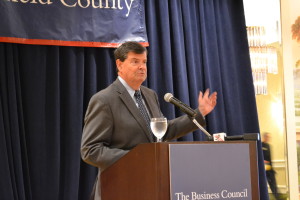The man in charge of the state”™s Department of Revenues Services seems to be on a roll ”” both in terms of departmental revamp efforts and in his appreciation of a barbed joke aimed squarely at him.
Starting his Oct. 2 presentation to the Business Council of Fairfield County at the Stamford Marriott with a “Dilbert” comic strip, Tax Commissioner Kevin B. Sullivan said it was his mission to make the DRS more responsive to taxpayers”™ needs. As Dogbert in the comic points out, many believe tax code writers derive sick pleasure out of making people”™s heads explode out of confusion.
“I get it,” Sullivan said in response to criticisms. “This is how Washington is seen, this is how Hartford is seen ”” that somehow we are about the business of making tax code as hard as possible; and enjoy making it as hard as possible for people to understand their obligations, meet their obligations and continue on to their lives and businesses.”

Responsible for tax collection and issuing returns, the DRS has historically seen itself as a policy enforcer, rather than a policy maker, Sullivan said. But Sullivan, the former lieutenant governor, said he believed the department should be a contributing voice in discussions over tax policy.
Through several strategic initiatives and lean-process improvements, Sullivan has helped reduce the size of the department by a third while simultaneously gaining more than $200 million in efficiencies. The department has started early intervention programs for tax evaders; started web-based assistance tools; and created the option of user-created payment plans.
Beyond “working smarter” Sullivan also said he believes the department should be more involved in policy discussions surrounding the state”™s more than 60 tax credit programs.
“Who pays when one company doesn”™t?” he said. “Which credits are really creating jobs?”
Every tax credit is evaluated, but Sullivan said he”™d like to see more analysis on the whole, answering questions like whether one big tax break for one company is more impactful than several smaller breaks for more companies. He also mentioned the possibility of companies being able to trade and sell credits on a secondary basis.
Sullivan said he supports Gov. Dannel P. Malloy”™s First Five initiative, which issues tax incentives to large growing companies; Sullivan, though, called for a more transparent system that allowed the DRS to analyze programs such as First Five.
At the conclusion of the event, Chris P. Bruhl, CEO of the business council, said he was pleased to see the DRS implementing many of recommendations set by the governor”™s business tax policy task force. Sullivan was a co-chairman of the task force, while Bruhl was a member representing the business community. The group”™s work officially concluded just over a year ago.
“People who sit on many commissions are accustomed to a warm thank you and that is the last that happens,” Bruhl said. “Here we got the warm thank you and they did it! So that was very favorable.”
From the use of plain English to standardizing auditor training, Bruhl said he was pleased to see the DRS acting on the things it could do to make using the system easier and to show its responsiveness.















